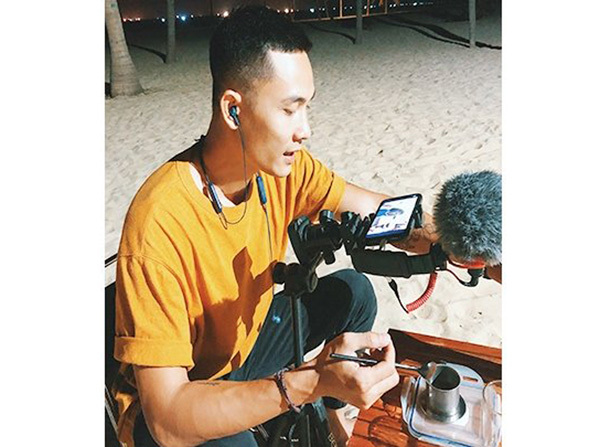In the context of the Covid-19 outbreak, with all tourism activities paralyzed, most tourism personnel have had to quit or change jobs, but there are still units and individuals willing to create initiatives and ways to make tourism operate in its own way.
 |
| Le Hoang with his online tour introducing Vietnamese coffee products to international guests. |
One of them is young guide Le Hoang, formerly specialising in international travel. In 2020, when foreign tourists stopped coming to Vietnam, Hoang and many colleagues fell into unemployment, and because of that, he was depressed. Hoang spent his time researching information online and learning about Airbnb’s newly launched online experience platform, which allows users organise online activities that can bring value to customers in many countries around the world.
Immediately, the young guide began to plan in detail the first online tour on the topic of Vietnamese coffee culture, teaching visitors how to make traditional Vietnamese coffee. All he needs is an internet-connected phone, a tripod, a noise-canceling microphone and the necessary ingredients.
Because it is an online tour, visitors can closely witness each stage, performed through the screen and interact directly with the guide to clarify any questions. Hoang also regularly changes the brewing location to both provide knowledge about coffee and help visitors learn more about beautiful Vietnam. Each tour is designed to take about one hour.
On Airbnb, his tour site received many positive reviews with 4.98 stars. Visitors enjoy his witty conversation, his knowledge of Vietnamese culture and the lifestyle behind stories about Vietnamese coffee.
“If you can’t bring guests to your country, why not bring your country closer to them?”, so in addition to the tour covering Vietnamese coffee, Hoang also expanded to operate online tours, such as a walking visit the Hanoi’s Old Quarter to learn the history of Hanoi.
Hoang’s tour mainly attracts foreign tourists from the EU, US, and Australian markets. There are tours with fixed fees, but also tours organized for free, the guide only accepting tips from participants.
Hoang said that on average, each tour usually has from seven to 10 guests; in addition, there are tours for 40 to 50 guests. Up to now, he has guided tens of thousands of customers on his online tours.
While Hanoi is in the midst of social distancing, Hoang is still busy with online tours of Vietnamese coffee at home. He plans to launch more tours to introduce the treasure of Vietnamese fairy tales in the future.
There have been and are businesses that also conduct online tours like Le Hoang, of which Ginatours is one of the few still trying to maintain operations in the middle of the pandemic. Currently, the business is a pioneer in shifting to tours organised in the form of “live broadcast”.
Directed mainly at students, domestic students and Japanese tourists, the company organises online tours according to individual themes for the purpose of combining education, such as: Tours to learn about war history at the War Remnants Museum in Ho Chi Minh City; Tours to visit the Cu Chi Tunnels Historic Site in Ho Chi Minh City; Tours to learn about Ao Dai (Vietnamese traditional long dresses) and Vietnamese folk culture at the Ao Dai Museum in Ho Chi Minh City; Tours to experience the daily life and specialties of the south-western region in My Tho, Tien Giang provinces; and Tours to experience the ancient town of Hoi An, Quang Nam Province.
A representative from Ginatours said that seeing as it is not possible to travel as easily as before, online tours ire a reasonable choice. With just an electronic device such as an ipad or phone connected to the internet, even at home, visitors can still participate in a journey to discover the cultural and natural scenery in famous tourist destinations, without moving and with economical cost advantages.
A special interesting point of these “livestream tours” is that visitors and guides can interact directly with each other at the time of broadcast, so it increases the excitement and sense of experience.
Although not massively popular, it is clear that online tours exploit the strengths of technology during the “Covid-19 storm” while ensuring safety for epidemic prevention and meeting the long-held travel demands of global tourists.
According to many experts, the longer the pandemic lasts, the more it will be necessary to see online tourism as a necessary direction to open the flow of tourism and partly limit the heavy losses being experienced in the industry.
From the process of conducting online tours, guides like Le Hoang also realise that among the tourists he serves, there are also people they suit perfectly such as the elderly and people with disabilities.
Therefore, even when the epidemic is controlled, online tourism is also a direction that should be promoted by tourism businesses. It is necessary to attract a market share of tourists who are not interested in the smokeless industry, that is, those who have a high demand for tourism but are limited in time, economic capacity or health in terms of making the more traditional trips.
Source: Nhan Dan



